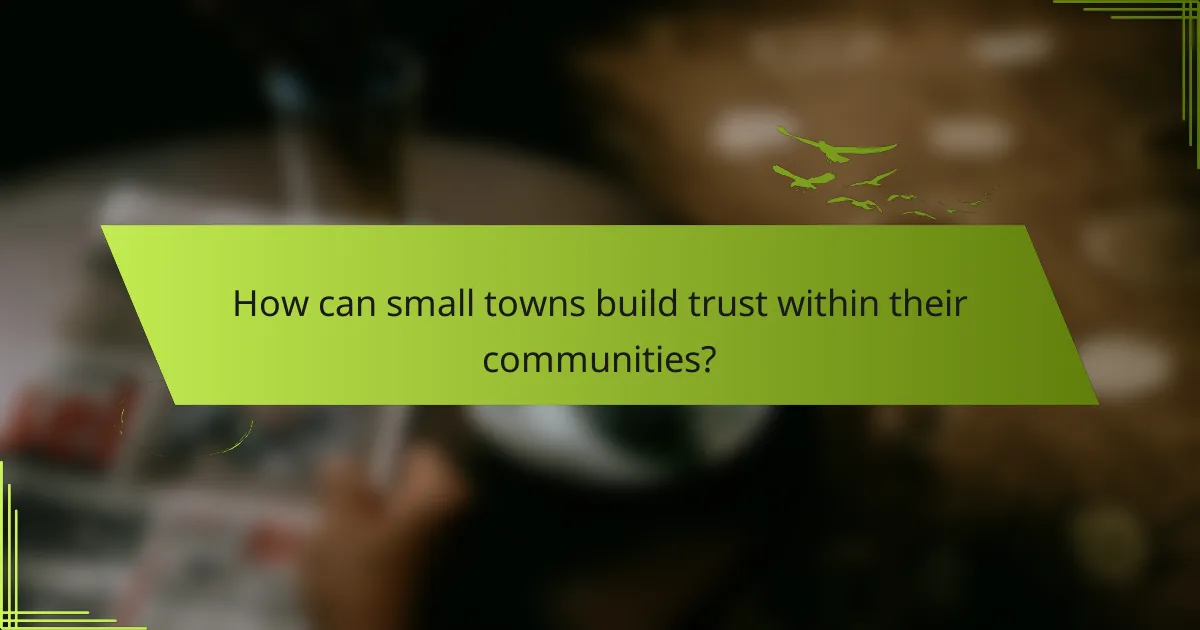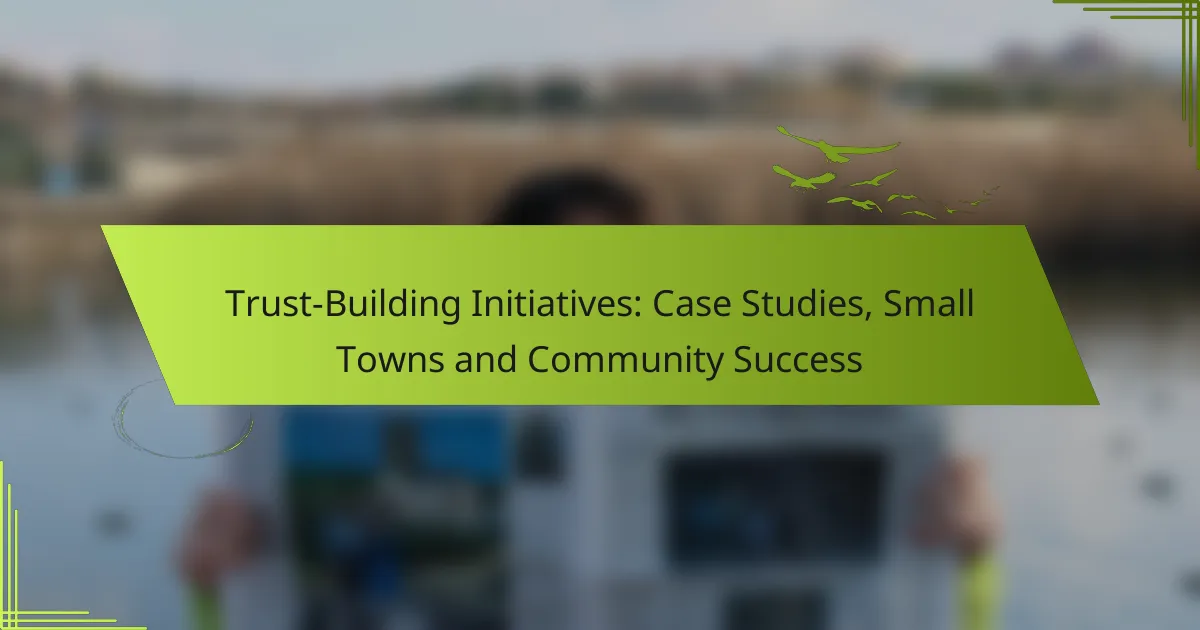Trust-building initiatives in small towns play a vital role in fostering community cohesion and accountability. By promoting open communication and engaging residents in decision-making, these efforts create partnerships that benefit both local businesses and the community. Successful case studies highlight how collaboration among residents, businesses, and government entities can enhance transparency and address the unique needs of the community.

How can small towns build trust within their communities?
Small towns can build trust within their communities by fostering open communication, engaging residents in decision-making, and creating partnerships that benefit local businesses and residents alike. These initiatives help create a sense of belonging and accountability among community members.
Community engagement programs
Community engagement programs are essential for building trust as they encourage participation from residents in local governance and activities. Initiatives such as town hall meetings, volunteer events, and feedback surveys allow citizens to voice their opinions and feel valued in the decision-making process.
To implement effective engagement programs, towns can start by identifying key issues that matter to residents and organizing events around those topics. Regularly scheduled meetings can help maintain momentum and ensure ongoing dialogue.
Local business partnerships
Forming partnerships with local businesses can strengthen community ties and enhance trust. Collaborations on events, sponsorships, or joint marketing efforts can create a sense of shared purpose and mutual benefit. This not only supports the local economy but also fosters loyalty among residents.
Small towns should consider creating a local business alliance to facilitate these partnerships. This alliance can organize community events, promote local products, and encourage residents to shop locally, reinforcing the importance of supporting one another.
Transparent communication strategies
Transparent communication strategies are crucial for building trust in small towns. Providing clear, consistent information about local issues, decisions, and developments helps residents feel informed and involved. Utilizing multiple channels such as newsletters, social media, and community boards can enhance outreach.
Towns should prioritize honesty and openness in their communications. Regular updates on projects, budget allocations, and community concerns can help mitigate misinformation and build a culture of trust. Establishing a feedback loop where residents can ask questions and receive timely responses is also beneficial.

What are successful case studies of trust-building initiatives?
Successful case studies of trust-building initiatives demonstrate how communities can foster cooperation and transparency among residents, local businesses, and government entities. These initiatives often involve collaborative projects that enhance social cohesion, improve communication, and address community needs effectively.
Case study: Greenville, South Carolina
In Greenville, a community-driven initiative called “Greenville Together” was launched to enhance trust between residents and local authorities. This program focused on regular town hall meetings where citizens could voice concerns and contribute ideas for local improvements.
Key to its success was the establishment of a citizen advisory board, which included diverse community members. This board facilitated ongoing dialogue and ensured that various perspectives were represented in decision-making processes.
Case study: Ithaca, New York
Ithaca implemented a “Neighborhood Engagement Strategy” aimed at building trust through grassroots involvement. This initiative encouraged residents to participate in local governance by organizing neighborhood councils that addressed specific community issues, such as housing and public safety.
The strategy emphasized transparency by sharing information about local government actions and decisions through newsletters and social media. This openness fostered a sense of ownership among residents, leading to increased participation in civic activities.
Case study: Sandpoint, Idaho
In Sandpoint, the “Sandpoint Community Forum” was established to create a platform for dialogue between citizens and local officials. This forum hosted regular discussions on community development, environmental sustainability, and social services, allowing residents to express their views and influence local policies.
To enhance trust, the forum incorporated feedback mechanisms, ensuring that community input was not only heard but also acted upon. This approach helped build a stronger sense of community and collaboration among residents and local leaders.

What role do local governments play in trust-building?
Local governments are crucial in trust-building by creating transparent policies and fostering community engagement. Their actions can significantly influence public perception and strengthen relationships between residents and officials.
Policy-making for community involvement
Effective policy-making involves actively engaging community members in the decision-making process. Local governments can hold public forums, surveys, or workshops to gather input, ensuring that policies reflect the community’s needs and values.
For example, a small town might implement a participatory budgeting process, allowing residents to vote on which local projects receive funding. This approach not only empowers citizens but also enhances trust in government actions.
Funding for local initiatives
Local governments can allocate funds to support initiatives that promote community trust, such as neighborhood improvement projects or social programs. By investing in local needs, governments demonstrate their commitment to the community’s well-being.
For instance, a town might set aside a portion of its budget for community events that foster interaction among residents, such as festivals or clean-up days. This funding can lead to stronger community ties and increased trust in local leadership.

How do community events foster trust?
Community events foster trust by creating opportunities for residents to interact, share experiences, and build relationships. These gatherings encourage open communication and collaboration, which are essential for establishing a strong sense of community.
Annual festivals and fairs
Annual festivals and fairs serve as vibrant platforms for community engagement, allowing residents to celebrate local culture and traditions. These events often feature local vendors, artists, and performers, which helps to promote local businesses and talents.
To maximize the impact of these festivals, organizers should consider involving diverse community groups to ensure representation and inclusivity. This approach not only enhances participation but also strengthens bonds among different demographics.
For example, a small town could host a harvest festival that includes food stalls, craft booths, and live music, attracting families and individuals from various backgrounds. Such events can significantly boost community morale and trust.
Town hall meetings
Town hall meetings provide a structured environment for residents to voice concerns and discuss community issues directly with local leaders. These gatherings promote transparency and accountability, which are crucial for building trust between citizens and officials.
To encourage participation, it is essential to schedule these meetings at convenient times and locations, ensuring accessibility for all community members. Using clear agendas and allowing ample time for questions can further enhance engagement.
For instance, a town might hold quarterly meetings where residents can discuss topics like budget allocations or new projects. This open dialogue fosters a sense of ownership and responsibility among community members, reinforcing trust in local governance.

What are the challenges faced in trust-building?
Trust-building initiatives often encounter significant obstacles that can hinder their effectiveness. Common challenges include resistance to change and a lack of resources, which can impede progress and community engagement.
Resistance to change
Resistance to change is a major barrier in trust-building efforts, as individuals and groups may be hesitant to alter established behaviors or beliefs. This reluctance can stem from fear of the unknown or a perceived threat to their interests.
To address resistance, it is crucial to engage community members early in the process. Providing clear communication about the benefits of trust-building initiatives can help alleviate concerns and foster a sense of ownership among participants.
Lack of resources
A lack of resources, including financial support, personnel, and time, can severely limit the scope and impact of trust-building initiatives. Small towns, in particular, may struggle to allocate sufficient funds or staff to these efforts.
To overcome resource limitations, communities can explore partnerships with local organizations, apply for grants, or leverage volunteer efforts. Prioritizing initiatives that require minimal investment but can yield significant community engagement can also be an effective strategy.

How can technology aid in trust-building initiatives?
Technology can significantly enhance trust-building initiatives by facilitating communication, transparency, and community engagement. Through various digital tools, communities can foster connections and create environments where trust can flourish.
Social media engagement
Social media platforms serve as powerful tools for engaging community members and building trust. By sharing updates, responding to inquiries, and highlighting local achievements, organizations can create a sense of belonging and transparency.
To effectively use social media for trust-building, communities should post regularly, encourage feedback, and showcase user-generated content. This two-way communication fosters a deeper connection and allows residents to feel heard and valued.
Online community platforms
Online community platforms provide dedicated spaces for residents to interact, share ideas, and collaborate on local initiatives. These platforms can range from forums to specialized apps designed for community engagement.
When implementing an online community platform, it’s essential to ensure user-friendliness and accessibility. Features like event calendars, discussion boards, and resource sharing can enhance participation. Regular moderation and active involvement from community leaders can further strengthen trust and engagement.

What metrics measure the success of trust-building initiatives?
Success in trust-building initiatives can be measured through various metrics that reflect community engagement and satisfaction. Key indicators include community satisfaction surveys, participation rates in local events, and feedback from community forums.
Community satisfaction surveys
Community satisfaction surveys are essential tools for measuring the effectiveness of trust-building initiatives. These surveys typically assess residents’ feelings about local governance, community cohesion, and overall quality of life. By gathering feedback directly from community members, towns can identify areas of strength and opportunities for improvement.
When designing these surveys, consider including questions that cover various aspects of community life, such as safety, accessibility of services, and responsiveness of local leaders. Aim for a response rate of at least 20-30% to ensure that results are representative of the community’s views.
To enhance the effectiveness of these surveys, use a mix of quantitative (rating scales) and qualitative (open-ended) questions. This approach allows for a deeper understanding of residents’ sentiments and can guide future initiatives to foster trust and engagement.
